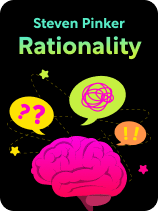

This article is an excerpt from the Shortform book guide to "Rationality" by Steven Pinker. Shortform has the world's best summaries and analyses of books you should be reading.
Like this article? Sign up for a free trial here.
What is a formal fallacy? How often do you perpetrate them? Can you detect them in the arguments of other people?
According to psychologist Steven Pinker, one of the main reasons people think irrationally is that they use logic and critical thinking incorrectly. They engage in fallacious arguments that lead to irrational conclusions. Formal fallacies are one common type of fallacy that people commit.
Read more to learn about a couple of common formal fallacies and the psychological bias that’s behind them.
Formal Fallacies
What is a formal fallacy? Pinker explains that a formal fallacy is one where the conclusion doesn’t follow logically from the premise—thus violating the form (the structure) of a logical statement. This means the premises are valid and true, but the conclusion drawn from them doesn’t follow logically and therefore isn’t valid.
One common formal fallacy is called denying the antecedent (in other words, saying the first premise isn’t true, and then drawing a false conclusion):
- Premise: A equals B.
- Premise: Not A.
- Conclusion: Therefore, not B.
Here, the conclusion is fallacious because it might not always be the case. For example, you might say:
- If a creature is a fish, it can swim.
- A human creature is not a fish.
- Therefore, a human cannot swim.
In this case, both premises are valid, but the conclusion is false.
Another common formal fallacy is called affirming the consequent (or, saying the second premise is true and then drawing a false conclusion):
- Premise: A equals B.
- Premise: B.
- Conclusion: Therefore, A.
This might play out as:
- If a creature is a fish, it can swim.
- Humans can swim.
- Therefore, humans are fish.
This type of fallacy, affirming the consequent, is a common one people fall for because it implies a reciprocity that seems straightforward but is often not true: Just because A equals B, we can’t necessarily say B equals A. However, without deeper reflection, that conclusion sometimes does seem valid.
This fallacy can lead us to poor decisions. For example, “Groundbreaking, blockbuster products are always ones that are new to the market” does not mean “Products that are new to the market are always groundbreaking blockbusters.” But, if an entrepreneur convinces us her new product is guaranteed to be successful simply because no one’s ever seen it before (relying on this fallacy), we might lose money on a poor investment.
| The Psychological Bias Underpinning Formal Fallacies In Poor Charlie’s Almanack, Charlie Munger credits a psychological bias called the reason-respecting tendency for causing people to fall for formal fallacies. This tendency makes us seek reasons behind outcomes (such as an event, behavior, thought, and so on), but it leads us to look for, and accept, any reason, even if it’s a poor reason (an illogical one). In one experiment demonstrating this tendency, people lined up at a copy machine would allow someone to cut in front of them regardless of whether that person gave a logical reason (“I’m in a rush”) or an illogical reason (“I need to make copies”). Reasons that lead to outcomes are essentially premises leading to conclusions, and our instinct to accept faulty connections between reasons and outcomes explains our tendency to fall for both types of fallacies outlined above—we focus on the fact that premises have been presented to us, and we ignore the lack of a solid, logical connection to the conclusion they supposedly lead to. The mere existence of a premise—any premise—feels convincing enough that we don’t examine it more deeply. |

———End of Preview———
Like what you just read? Read the rest of the world's best book summary and analysis of Steven Pinker's "Rationality" at Shortform.
Here's what you'll find in our full Rationality summary:
- Why rationality and reason are essential for improving our world and society
- How you can be more rational and make better decisions
- How to avoid the logical fallacies people often fall victim to






